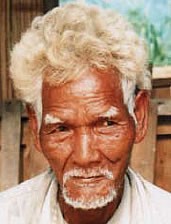Jah Hut, Cheres in Malaysia

Photo Source:
Copyrighted © 2026
Southeast Asia Link - SEALINK All rights reserved. Used with permission |
Send Joshua Project a map of this people group.
|
| People Name: | Jah Hut, Cheres |
| Country: | Malaysia |
| 10/40 Window: | Yes |
| Population: | 5,000 |
| World Population: | 5,000 |
| Primary Language: | Jah Hut |
| Primary Religion: | Ethnic Religions |
| Christian Adherents: | 2.00 % |
| Evangelicals: | 0.10 % |
| Scripture: | Complete Bible |
| Ministry Resources: | Yes |
| Jesus Film: | No |
| Audio Recordings: | No |
| People Cluster: | West Malaysia Indigenous |
| Affinity Bloc: | Malay Peoples |
| Progress Level: |
|
Introduction / History
The Jah Hut (Jah and Hut are two separate words meaning "people" and "no") are one of the nineteen original Orang Asli people groups of Peninsular Malaysia. The government classifies them under the Senoi subgroup.
Jah Hut villages are in the foothills of the Jerantut and Temerloh districts of Pahang, Selangor, and Negeri Sembilan.
What Are Their Lives Like?
In the past, the Jah Hut people collected rattan and resin from the jungle to sell to outsiders. Like the Mah Meri, they were also known for their fine woodcarving skills. They depended on the forest for building and craft materials - such as poles, bamboo, and thatch for houses and straw or fiber for mats. They used to have a profitable woodcarving industry. However, with the effect of constant relocation and outside parties seizing their land and forests, this rural population is left without a subsistence base. Lacking land, trees, or forest produce, the only thing they must generate income is their labor. Today, they have few job options. With limited education and skills, they are generally engaged in the lowest of jobs with little prospect for job improvement or job satisfaction. Ironically, the most readily available jobs for them are in the very industries that displaced them: logging and various plantations.
The Jah Hut are a group of unskilled workers scrounging these days for a living in Malaysian society. They usually work on a contract basis or as pieceworkers rather than as salaried employees. Thus, their employment is sporadic, unreliable, and often takes the workers far from home. Because they have little control over the conditions of their employment - they must take what they can get - they are often cheated out of portions of their earnings. On the surface they seem to have an increase in the level of cash income. This observation, however, does not consider the destruction of the free traditional economies in the forest that benefited them in the past.
What Are Their Beliefs?
Their main festival is the "Day of the Spirits" where offerings are made to the spirits to avoid ill fortune. The Jah Hut puyang (witchdoctors) and pawang (magicians) play important roles in healing sicknesses and dealing with spiritual matters. The Jah Hut custom requires all young boys to be circumcised as a rite of adulthood. They are one of the non-Muslim Orang Asli people groups who practice circumcision. The circumcision functions not only as an ethnic marker but also as a way of uniting the community for a large feast and, if the family can afford it, a drinking party afterward. It is also an opportunity to display wealth and status.
What Are Their Needs?
The Jah Hut people do not place much value on education and skill development. They depend on the forest for income. Developers are taking away land, trees and forest produce, and labor seems to be the only source of income for some Jah Hut. Pray that the Creator will call out believers to help meet the physical need of the Jah Hut. Since the Jah Hut have a fairly high percentage of believers compared to many of the other Orang Asli groups, pray for Jah Hut believers to serve as ambassadors to other villages.
Prayer Points
Pray for the Jah Hut people to have hearts that are open to the abundant blessings of Jesus Christ.
Pray for their families to prosper financially and spiritually as they experience a relationship with Jesus Christ.
Pray for a Christ-ward movement among the Jah Hut that will spread joy, peace, and salvation to other peoples.